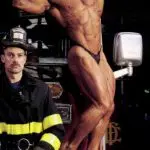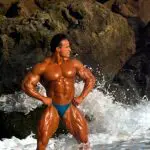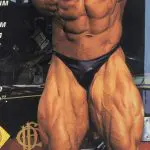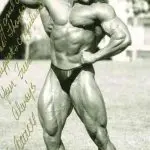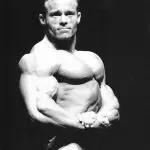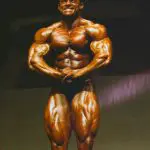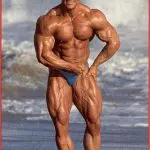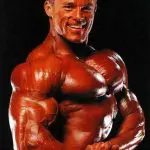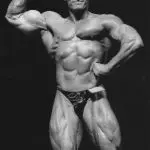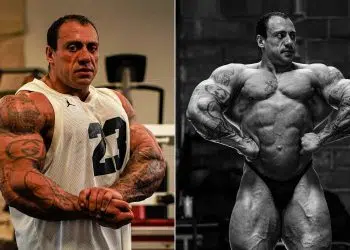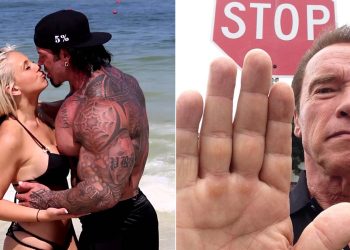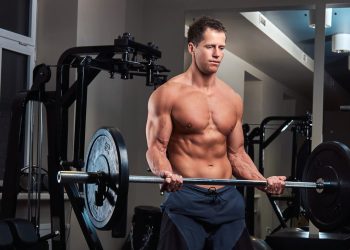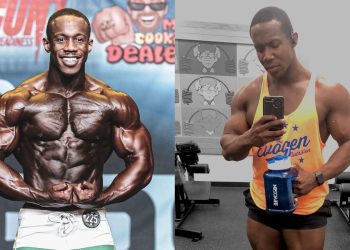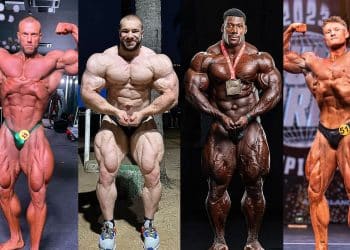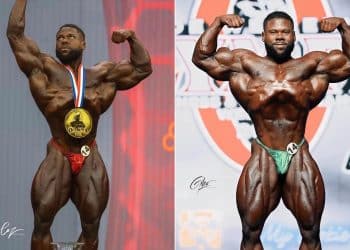Porter Cottrell is a retired American professional bodybuilder who competed in the IFBB Pro League. He is best known for competing in the 1980s and the 1990s era of bodybuilding. This is his complete profile, biography, workout routine, diet, and statistics.
Porter Cottrell
Born: August 30, 1961
Birthplace: Louisville, Kentucky, USA
Residence: Mount Washington, Kentucky, USA
Nickname: The Southern Gentleman
Height: 5′ 8″ (173 cm)
Competition Weight: 194 lbs (88 kg)
Porter Cottrell Biography
Early Life
Porter Cottrell was born on August 13, 1961 in the USA. He was inspired by the likes of actor Steve Reeves, whom he saw in the movie Hercules. Cottrell strived to build a physique like that as a kid and never wavered from his dream in the following years.
Level Up Your Fitness: Join our 💪 strong community in Fitness Volt Newsletter. Get daily inspiration, expert-backed workouts, nutrition tips, the latest in strength sports, and the support you need to reach your goals. Subscribe for free!
His curiosity to know more about bodybuilding and strength training led to discover that his friend had a collection of bodybuilding magazines. Exposure to these magazines fuelled Cottrell’s desire further to build a massive physique.
But young Porter was far from getting started with serious training immediately. The opportunity, however, showed up when he was 12 years old. Cottrell’s brother received a concrete weight set as a gift but he never used it. The curious Porter used this opportunity to set himself on the desired path.
“I started working out in my garage and later in a small shed with some of the guys in the neighborhood.”
In the following years, Porter Cottrell started working as a welder to earn money but the dream to become a bodybuilder was never lost. Cottrell kept working his job while also training in his free time or whenever he could.
While this was helping him make ends meet, it was not a stable career that he could bank on. But good fortune was on Cottrell’s side and he got a job as a firefighter. This job gave him job satisfaction for being able to help people and most importantly, it presented a perfect opportunity for him to focus on bodybuilding as well.
Porter’s job required him to remain physically fit and strong so he had to focus on diet, rest, and training. Additionally, firefighters followed a 24-hour on, 48-hour off work routine and almost all of them worked another job during the two off days.
Porter Cottrell used those off days to focus on bodybuilding and eventually reached a stage where he was comfortable to step onto the competitive stage and pursue a career in professional bodybuilding.
Bodybuilding Career
Cottrell kicked off his bodybuilding career by winning the 1988 NPC Junior National Championships and never looked back. He continued participating in the amateur bodybuilding shows over the next couple of years and earned the IFBB Pro Card by winning the 1991 NPC National Championships.
Porter Cottrell was a bright shining star right from the beginning as he kicked off his professional bodybuilding career with a first-place finish at the 1992 Chicago Pro Invitational. He achieved several top four and top seven places in the subsequent shows and secured another thumping victory at the 1992 Niagara Falls Pro Invitational.
With podium finishes at reputed shows like the Arnold Classic and Night of Champions among others, Cottrell became a top contender of his generation that gave some of the most elite competitors of his time a run for the money.
Cottrell’s Mr. Olympia debut came in 1993 and he surged into the top 10 in his maiden appearance on the grandest stage of bodybuilding with an eighth-place finish. In his only Mr. Olympia appearance after this, in 1995, Porter Cottrell achieved a top-five finish. Unfortunately, he never competed at Mr. Olympia again and therefore could not improve his standing.
Porter Cottrell retired from competitive bodybuilding following a third-place finish at the 199 Toronto Pro Invitational and left behind a good legacy in the sport. Cortell continued to work as a firefighter after retiring from bodybuilding and retired from his job almost a decade later.
Life after retirement
Porter Cortell started his own training business after he retired as a firefighter and now helps people achieve their fitness goals as a personal trainer and guide. Cottrell was fed up with the gimmicky weight loss and muscle-building programs available in the fitness industry.
He decided to take it upon himself to share decades worth of his bodybuilding knowledge and experience to help people achieve their goals. Over the years, he has helped hundreds of clients take control of their health and fitness without falling prey to fad diets and questionable training advice.
“My passion as I get older is to help guys over 40 lose weight, build muscle, and feel great into their 40s, 50s, 60s, and beyond.”
View this post on InstagramGet Fitter, FasterLevel Up Your Fitness: Join our 💪 strong community in Fitness Volt Newsletter. Get daily inspiration, expert-backed workouts, nutrition tips, the latest in strength sports, and the support you need to reach your goals. Subscribe for free!
Competition History
- 1984 Mr. Louisville – 1st place
- 1984 Mr. Kentucky – 1st place
- 1987 Mr. Continental USA – Overall winner
- 1988 Junior National Championships – NPC, Overall Winner
- 1988 Junior National Championships – NPC, Light-HeavyWeight -1st place
- 1989 National Championships – NPC, Light-HeavyWeight – 3rd place
- 1991 National Championships – NPC, Light-HeavyWeight -1st place
- 1992 Chicago Pro Invitational – IFBB – 1st place
- 1992 Grand Prix England – IFBB – 5th place
- 1992 Grand Prix Germany – IFBB – 4th place
- 1992 Grand Prix Holland – IFBB – 7th place
- 1992 Grand Prix Italy – IFBB – 5th place
- 1992 Niagara Falls Pro Invitational – IFBB – 1st place
- 1992 Night of Champions – IFBB – 2nd place
- 1992 Olympia – IFBB – 8th place
- 1993 Chicago Pro Invitational – IFBB – 1st place
- 1993 Night of Champions – IFBB – 1st place
- 1993 Pittsburgh Pro Invitational – IFBB – 1st place
- 1994 Arnold Classic – IFBB – 3rd place
- 1994 Grand Prix England – IFBB – 9th place
- 1994 Grand Prix Germany – IFBB – 7th place
- 1994 Grand Prix Spain – IFBB – 5th place
- 1994 Olympia – IFBB – 5th place
- 1994 San Jose Pro Invitational – IFBB – 2nd place
- 1996 Arnold Classic – IFBB – 8th place
- 1996 San Jose Pro Invitational – IFBB – 10th place
- 1998 Night of Champions – IFBB – 6th place
- 1998 San Francisco Pro Invitational – IFBB – 6th place
- 1998 Toronto Pro Invitational – IFBB – 4th place
- 1999 Night of Champions – IFBB – 9th place
- 1999 Toronto Pro Invitational – IFBB – 3rd place
Porter Cottrell Workout
Porter Cottrell followed a two-day off, one-day off training routine from firefighting days during his competitive bodybuilding career as well. This is the same routine he follows even today. Cottrell feels that it gives his body enough time to recover, and recuperate to handle the stress of heavy training for the next two days once again.
Cottrell used the simple progressive overload method to improve his strength and muscle mass for the majority of his career instead of using any complex training methods. As he got older, Cottrell became more careful with his health and got his health checked before starting training programs or making any major changes to his existing training programs to make sure his body was in tip-top shape to handle the stress.
Porter Cottrell’s two-day on, one-day off training routine had another interesting aspect to it. The veteran bodybuilder never into the gym to perform predetermined exercises. Instead, he went into the gym and decided on the go which exercises he would perform next to target the specific muscle groups.
“When you do same thing over and over and over, your body adjusts to it. Such an intelligent mechanism. So if you come in here every day and did something different, the instinctive principle, per se, is what’s going to enable you to keep prospering. Therefore your physique will constantly respond and constantly accept.”
Cottrell has been a huge believer in allotting enough time to get a sufficient warm-up before exercises to remain injury-free and never fails to perform warm-up sets, especially on heavier compound movements before lifting heavy.
The two-day-on, one-day-off training split in Porter Cottrell’s workout regime looked like this:
Day 1 – Full Body
In each training session, Cortell would perform a full-body workout. Below is a sample of his typical training session. However, this was never a rigid workout and Cortell frequently changes the exercises, sequence, rep range, and techniques as well.
Chest
On the push day, Cottrell starts his workout with chest exercises. He is not a big fan of flat bench press and prefers doing incline pressing movements for fully engaging the upper pecs and anterior deltoids.
- Incline Bench Press – 4 sets of 6 to 12 reps
- Incline Dumbbell Press – 4 sets of 6 to 12 reps
- Machine Chest Press – 4 sets of 6 to 12 reps
- Cable Crossover – 4 sets of 6 to 12 reps
Shoulders and Traps
For shoulder training, Cottrell puts a lot of emphasis on working the lateral delts. He believes that it is, in fact, the properly developed lateral delts that give the body that rounded, broad-shouldered look that most bodybuilders desire.
- Dumbbell Lateral Raises – 4 sets of 6 to 12 reps
- Incline Dumbbell Rear Delt Flyes – 4 sets of 6 to 12 reps
- Dumbbell Shrugs – 4 sets of 6 to 12 reps
Back
For back, Cottrell believes in using heavier weights to stimulate and activate all the major muscles. According to Cottrell, bent over barbell row is the complete exercise for back development that gives a fuller, wider, and thicker look to the back. But he advises to be careful while performing this exercise and suggests keeping the back arched with knees slightly bent to avoid injuries.
- Lat Pulldowns – 4 sets of 8 to 25 reps
- Bent Over Barbell Rows – 4 sets of 8 to 25 reps
- One Arm Dumbbell Rows – 4 sets of 8 to 25 reps
- Hyperextensions – 3 sets of 15 to 25 reps
Biceps
Cottrell performs high-volume sets of exercises for biceps with moderate weights to get the most out of them. He does not complicate the workout and keeps things simple with the following exercises:
- Standing Dumbbell Curls – 4 sets of 15 to 25 reps
- EZ Bar Preacher Curls – 4 sets of 15 to 25 reps
- Dumbbell Concentration Curls – 3 sets of 12 to 20 reps
Legs
While most people consider barbell squats to be the bread and butter of lower body development, Porter Cottrell does not rely on this exercise to build his legs.
“I haven’t squatted in about 10 years because I want to keep my waist and butt as small as possible. Yet my legs keep improving.”
To compensate for the benefits of squats, Cottrell performs exercises like leg presses, which also work the glutes, hamstrings, and quadriceps like the traditional squats.
- Leg Extensions – 4 sets of 12 to 15 reps
- Leg Press – 4 sets of 12 to 15 reps
- Lying Leg Curls – 3 sets of 10 to 25 reps
- Standing Calf Raises – 3 sets of 10 to 25 reps
- Seated Calf Raises – 3 sets of 10 to 25 reps
Triceps
Cottrell starts his triceps routine with cable triceps pushdowns to pre-exhaust the muscles and warm up the elbow joints which are crucial in most of the triceps exercises. He then follows up with a few movements that work the muscles from different angles and positions to achieve complete development.
- Cable Triceps Pushdowns – 4 sets of 10 to 20 reps
- Close-Grip Bench Press – 3 sets of 10 to 15 reps
- One-Arm Overhead Dumbbell Triceps Extensions – 3 sets of 10 to 20 reps
Day 2 – Full Body
Day 3 – rest
Porter Cottrell Diet
Porter Cottrell firmly believes that training, lifting heavy weights, and doing cardio only stimulates the muscles and that the actual process of growth happens when you provide the body with all the nutrients in balanced quantities.
For the most part, Cottrell followed a high-protein, moderate carbohydrate, and low-fat diet. Interestingly, Porter Cottrell did not have a mentor who taught him the rights and wrongs of the bodybuilding diet. He acquired the knowledge himself through books and other media, and judging by his physique, did a good job on that front as well.
Cottrell never believed in using protein drinks and based his meals on protein. He got all of his calories from an organic whole-food diet, even if it was difficult at times to consume massive amounts of food. However, he has made a few mistakes along the way and learned from them.
“When I was competing, I did not understand my body as well as I do now. I just got lucky. I put all the pieces together. I stayted on what was a borderline ketogenic diet. Meaning, when it got down to the last six or seven weeks before the show, my carbohydrate intake would be 100 to 125 grams. I felt miserable, let me just say that. I kept the protein up but how stupid was I to not understand how pivotal and how important the essential fat was for you body! So I suffered terribly through my shows.”
However, Cortell learned from his mistakes and adopted a more balanced and healthy diet afterward.
A typical full day of eating in Porter Cortell’s competition prep looked like this:
Meal 1
- 10 Egg Whites
- 4 Ounces Cream of Rice
- 4 Ounces Banana
- 1 Tablespoon Flaxseed Oil
Meal 2
- 6 Ounces Potato
- Half a cup of Vegetables
- 6 Ounces of Turkey
Meal 3
Same as Meal 2 but vegetables may vary
Meal 4
- 10 Ounces Orange Roughy
- Vegetables
Meal 5
- 10 Egg Whites
- 4 Ounces Diced Apple
To Conclude…
Despite being one of the relatively lesser-known bodybuilders for the younger generations, Porter Cottrell has a legacy that deserves a place in history. His brutal honesty about the mistakes he made in terms of diet and workout shows the never-ending hunger for improvement.

